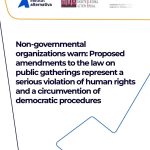21/7/2016 AN APPEAL FOR HOLDING A CONSULTATIVE HEARING ON THE PROPOSED AMENDMENTS TO THE MEDIA ACT
22/07/201627/7/2016 WHISTLEBLOWER WINS AGAINST RAILWAY INFRASTRUCTURE CO.
27/07/201626/7/2016 CANCELED CONSULTATIVE HEARING ON PROPOSED MEDIA ACT AMENDMENTS
The consultative hearing on amendments proposed to the Media Act, which has been unanimously scheduled by the Parliamentary Committee for Political System, Justice and Administration, was canceled yesterday because members of the Committee from the Democratic Party of Socialists (DPS) Milorad Vuletić, Husnija Šabović, Marta Šćepanović, Veljko Zarubica and Šefkija Murić ignored the scheduled session. This was an obvious demonstration of the lack of political will to discuss proposed amendments, but also a show of lacking political culture to announce such a move to the colleagues from the Committee and invited participants to the hearing, who arrived timely, some of them despite the annual leave. The proposed amendments aimed at introducing standards from the jurisprudence of the European Court of Human Rights as well as transparent advertising of the state in the media.
Even seven months since the Committee decided to hold a hearing on the need for amending the Media Act on 7th of December 2015, upon the proposal of HRA, the political will of the ruling party DPS to discuss the subject is still missing.
The Parliament of Montenegro never held a debate on the state of media freedom, law and practice, despite such expectations of the European Commission (see Guidelines for support to media freedom and media integrity in the Western Balkans and in Turkey from 2014-2020). By organising the consultative hearing the Committee could have compensated for the lack of such debate in the past. Also, the European Commission ever since the Opinion on the accession of Montenegro to the European Union in 2010 continuously recommended Montenegro to find a way for the courts to consistently apply the European standards of freedom of expression.
Thanks to MPs Rifat Rastoder, Dritan Abazović and Zoran Miljanić, who included HRA proposal for amendment of the Media Act from 2015 in their Proposal of Law Amending the Media Act, the Montenegrin Parliament finally on 25th of July 2016 on the plenary session discussed the proposed amendments.
The discussion was unfortunately reduced to the astonishment of MPs with regard to the European standards that already exist in laws of neighbouring countries and are widely applied throughout Europe. The debate clearly showed that the political will is essential for the understanding and acceptance of European standards.
HRA regrets the cancelation of the hearing and missed opportunity that the experts at the invitation of the Committee “help the committee members decide on this law, but also the general public in the assessment of its content”, as stated in the invitation by the Committee president Snežana Jonica.
HRA has been publicly advocating amendment of the Media Act since November 2010. We have on two occasions informed the responsible ministers and other government representatives and politicians on the need to modernise the Act and provided them with the concrete detailed and reasoned proposal. However, it is obvious that despite our best intentions, the political will of those who decide on such issues may be influenced only from some much more influential address.







 English
English